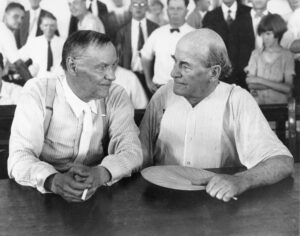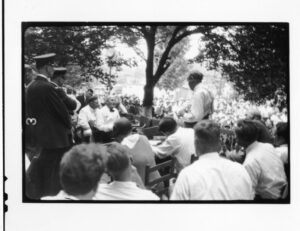100 years ago, in July 1925, Dayton, Tennessee, a sleepy rural town, became the epicenter of a dramatic showdown over science, religion, and education. What was meant to be a modest legal test balloon turned into a national—and international—spectacle. (Encyclopedia Britannica, HISTORY)
The Butler Act: Setting the Stage
The spark was the Butler Act, passed in March 1925 by Tennessee lawmakers. This law made it a misdemeanor for public school teachers to teach that humans evolved from lower animals, directly contradicting the Biblical creation story. Violators could be fined between $100-500. (Wikipedia)
A Town’s PR Stunt
Local business leaders and school officials in Dayton deliberately sought a test case to draw attention. They recruited John T. Scopes—a 24‑year‑old science teacher who typically taught math and physics—to admit teaching evolution. He was arrested, and the media storm began. (TLSA)
The Players Enter the Fray

- Prosecution: William Jennings Bryan, celebrated orator and three‑time Democratic presidential nominee, championed biblical literalism. He argued evolution threatened religious moral order. (American Civil Liberties Union)
- Defense: Clarence Darrow, renowned defense attorney and ACLU member, took up Scopes’s defense pro bono, seeking to challenge the Butler Act under the Constitution. (American Civil Liberties Union)
A Media Circus
Dubbed the “trial of the century,” the case drew over a thousand spectators, hundreds of reporters, and even broadcasts on live radio—America’s first. Dayton was flooded with journalists, thrill‑seekers, and circus‑like attractions. (HISTORY)
Courtroom Drama

- The trial began on July 10, housed in the Rhea County Courthouse under sweltering heat. (HISTORY)
- The judge forbade scientific expert testimony. In a bold move, Darrow called Bryan himself to the stand, forcing him into a cross-examination over his interpretation of the Bible—a media moment that became legend. (American Civil Liberties Union)
- Darrow even asked the jury to find Scopes guilty so the defense could immediately appeal. On July 21, 1925, after less than nine minutes of deliberation, the jury did so, and Scopes was fined $100. (PBS)
Aftermath: Verdicts, Appeals, Legacies
- Scopes’s conviction was overturned in 1927 on a technicality (the judge imposed the fine, not the jury). But the Butler Act itself was upheld—and remained law until its repeal in 1967. (HISTORY)
- Bryan died just five days after the trial, reputedly worn out by the ordeal. Darrow, meanwhile, had helped shift public sentiment—many saw Scopes and his supporters as moral victors. (American Civil Liberties Union)
Cultural Significance & Ongoing Relevance
- The trial highlighted a deeper conflict between modernism and fundamentalism, between urban progress and rural conservatism. It changed perceptions about academic freedom and the proper role of religion in public schools. (Live Science)
- Its legacy endures. The debate over teaching evolution—or more religious perspectives—continues in many parts of the U.S., with fresh controversies in states like West Virginia, Texas, and Louisiana. (AP News)
Myth vs. Reality
Popular dramatizations like Inherit the Wind (1955 play and 1960 film) took liberties that altered key details for dramatic effect—such as creating fictional characters and exaggerated confrontations. While they brought the story to a mainstream audience, historians emphasize the importance of distinguishing fact from fiction. (Wikipedia, The Christian Science Monitor, Live Science)
Conclusion
The Scopes trial transcended a small‑town legal skirmish—it became a defining moment in American cultural history, plotting the turbulent crosscurrents between science, religion, law, and media. Though Scopes lost the verdict, the broader argument was won for evolution and academic freedom. Its echoes still shape debates on education and belief in the 21st century. (AP News)